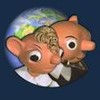Sky Is Wider (Širší než nebe, 2016)
Linda Marshall Griffiths. Rozhlasová hra. Zvukový design Steve Brooke. Odborná spolupráce Anil Seth. Režie Nadia Molinari.
Osoby a obsazení: Ella (Christine Bottomley), Charlie (Sydney Wade), neurolog (Wil Johnson), sestra (Yusra Warsama).
Nastudoval BBC v roce 2016. Premiéra 6. 7. 2016 (BBC Radio 4, 14:15 h.; 45 min.) v cyklu States of Mind (Stavy mysli). K poslechu zde.
Cena Best Drama za rok 2016.
Alternativní verze názvu: Nebe je širší
Lit.: anonym: States of Mind: The Sky Is Wider. In web BBC Radio 4, červenec 2016 (článek). – Cit.: When Ella is asked questions pointing her towards places and memories, she begins to realise that the world she lives in now is just the imagined life of her mind and in reality she is in hospital in a minimally conscious state. Ella realises that these questions, posed by a neurologist, are attempts to discover whether she is conscious and that her possible answers are her only way to communicate with others, especially with her daughter, Charlie, who has her own questions that desperately need answers.
The Sky is Wider was developed through Wellcome Experimental Stories in consultation with Anil Seth (Professor of Cognitive and Computational Neuroscience and co-director at Sackler Centre for Consciousness Science, University of Sussex). The drama was inspired by the themes of the current States of Mind exhibition at Wellcome Collection in London which explores the nature of consciousness and runs until 16th October 2016.
The drama asks what it is to be a self. It explores an ‚active approach‘ in which the neurologist asks questions of the patient in an attempt to ascertain their level of consciousness by examining the brain responses. Currently brain imaging (fMRI, EEG) can be used to actively decode responses to questions in patients who, following severe brain injury, are left in minimally conscious states. These methods represent a revolution in clinical neurology; allowing us to assess whether there is any residual consciousness or awareness left, following devastating brain injury and allowing us to open a means of communication. (…)
Listen on headphones for a unique 3D immersive experience.
Lit.: Seth, Anil: At the edges of awareness. In web BBC Radio 4, červenec 2016 (článek). – Cit.: Professor of Cognitive and Computational Neuroscience and co-director at Sackler Centre for Consciousness Science, University of Sussex.
Imagine this. Following a brain injury you lie in a hospital bed and from the outside you appear to be totally unconscious. You don’t respond to anything the doctors or your family say, you make no voluntary movements, and although you still go to sleep and wake up there seems to be nobody at home. But your ‘inner universe’ of conscious awareness still remains, perhaps flickering and inconsistent, but definitely there. How could anyone else ever know, and how could you ever communicate with your loved ones again?
Two radio dramas, The Sky is Wider and Real Worlds, engage with these critical questions by drawing on the cutting edge of the neurology and neuroscience. Recent advances have enabled researchers to not only diagnose ‘residual’ awareness following severe brain injuries, but also to open new channels of communication with behaviourally unresponsive patients. The key medical challenge is to distinguish between the so-called ‘vegetative state’ in which there truly is no conscious awareness, from ‘minimally conscious’ or ‘locked-in’ conditions where some degree of consciousness persists (even normal consciousness, in the locked-in state), even though there are no outward signs.
Linda Marshall Griffiths‘ drama The Sky is Wider takes inspiration from an ‘active approach’ in which the neurologist asks questions of the patient and monitors their brain activity for signs of response. In a classic study from about 10 years ago, Adrian Owen and his team asked behaviourally unresponsive patients to imagine either walking around their house or playing tennis, while their brains were scanned using functional MRI (which measures regional metabolic activity in the brain). These questions were chosen because imagining these different behaviours activates different parts of the brain, and so if we see these selective activations in a patient, we know that they have understood and are voluntarily following the instructions. If they can do this, they must be conscious. It turns out that between 10-20% of patients behaviourally diagnosed as being in the vegetative state can pass this test. Equally important, this same method can be used to establish simple communication by (for example) asking a patient to imagine playing ‘tennis’ to answer ‘yes’ and walking around a house to answer ‘no’.
These developments represent a revolution in clinical neurology. Current research is increasing the efficiency of active approaches by using the more portable electroencephalography (EEG) instead of bulky and expensive MRI. ‘Passive’ techniques in which residual consciousness can be inferred without requiring patients to perform any task are also rapidly improving. These methods are important because active approaches may underestimate the incidence of residual awareness since not all conscious patients may understand or be able to follow verbal instructions.
Alongside these scientific developments we encounter pressing ethical questions. How should we treat patients in these liminal states of awareness? And given a means of communication, what kinds of questions should we ask? The Sky is Wider explores these challenging ethical issues in a compelling narrative which gives dramatic voice to the mysterious conditions of the vegetative and minimally conscious states.
Lit.: Seth, Anil: The Sky is Wider wins Best Drama 2016. In web Anil Seth, 31. 1. 2017 (článek). – Cit.: The Sky is Wider won the prestigious Best Single Drama award at the 2017 BBC Audio Drama Awards, held in London in January. It also picked up Best Actress for Christine Bottomley’s portrayal of the lead character Ella (beating Helen from The Archers!).
The drama, written by Linda Marshall-Griffith and produced by Nadia Molinari for BBC North, was conceived at a Wellcome Trust ‚Experimental Stories‘ workshop three years ago, in Cambridge. I was extremely lucky to be paired with Linda and Nadia, and over 2 days the idea for the Sky is Wider took shape – though it took much longer and many more conversations before the final script was ready, and the production strategy fully set. The play explores the ethical and emotional consequences of emerging methods to communicate with patients in a minimally conscious state through mental imagery and neuroimaging. It was broadcast on Radio 4 in July 2016 and selected as BBC Radio Pick of the Year in December. Before winning the BBC Prize, it was shortlisted for the 2016 Prix Europa for radio drama. Many many congratulations to Linda, Nadia and Christine – I just feel lucky to have been along for the ride.
The judges said: „We thought ‚The Sky is Wider‘ was a perfect radio play the explored the neurology and ethics surrounding the treatment of a patient with minimal consciousness … It felt an important piece and we were all moved by it … A stunning achievement“.
Pictured (left to right): Christine Bottomley, Linda Marshall-Griffith, Nadia Molinari, and me. Find out more about the science behind the play, listen to it (much better through headphones for the full binaural experience), and browse some photos from the award ceremony.
If you enjoyed this post, please consider to leave a comment or subscribe to the feed and get future articles delivered to your feed reader.






Komentáře
Zatím nemáte žádné komentáře.
Napište komentář k článku